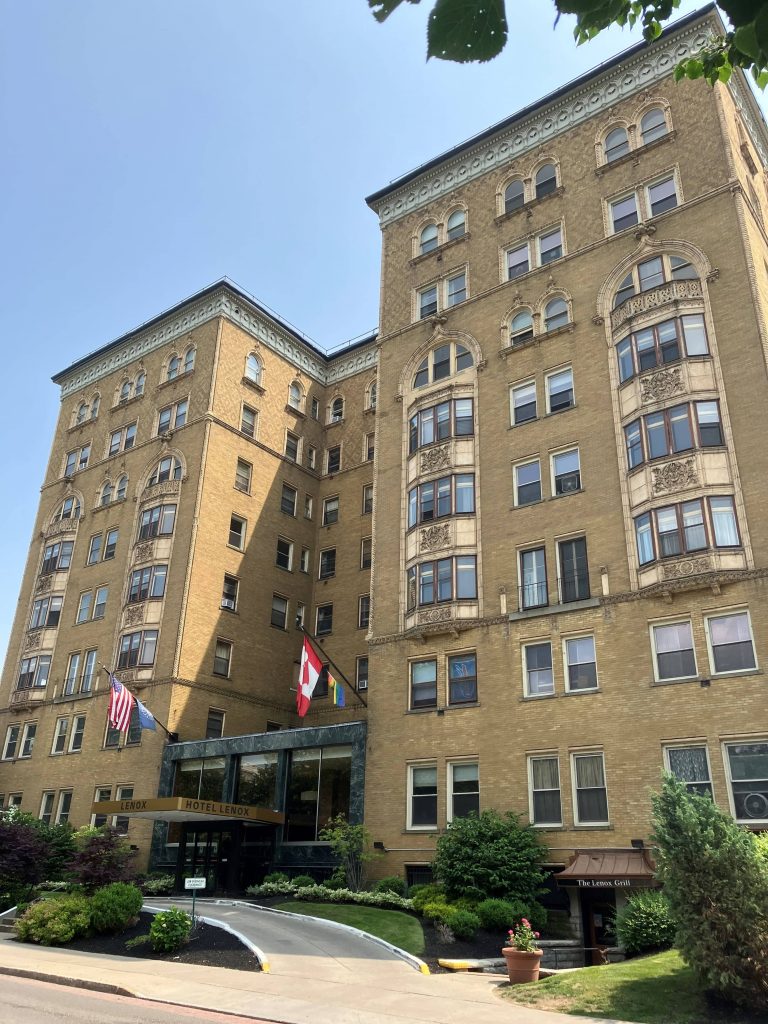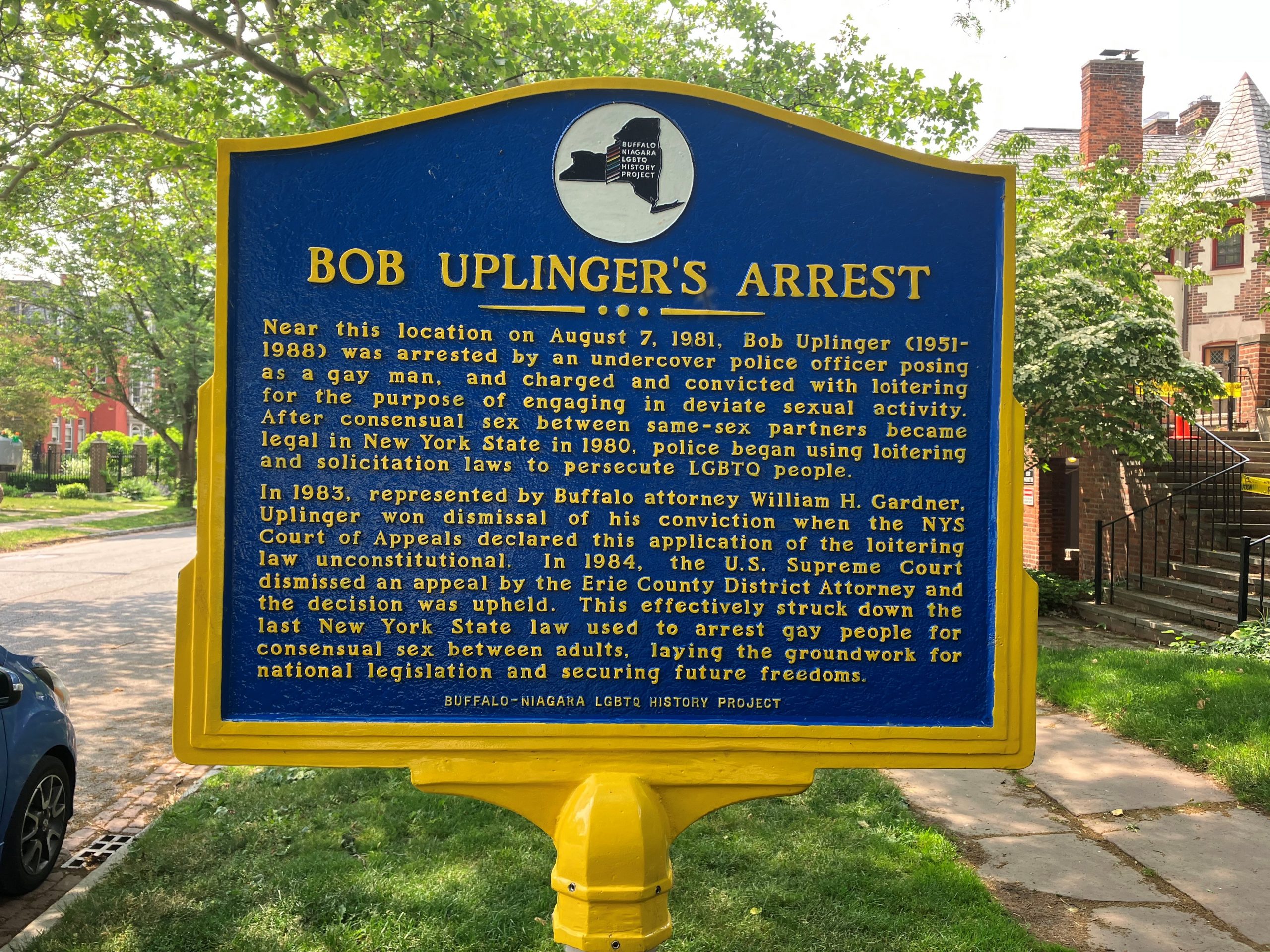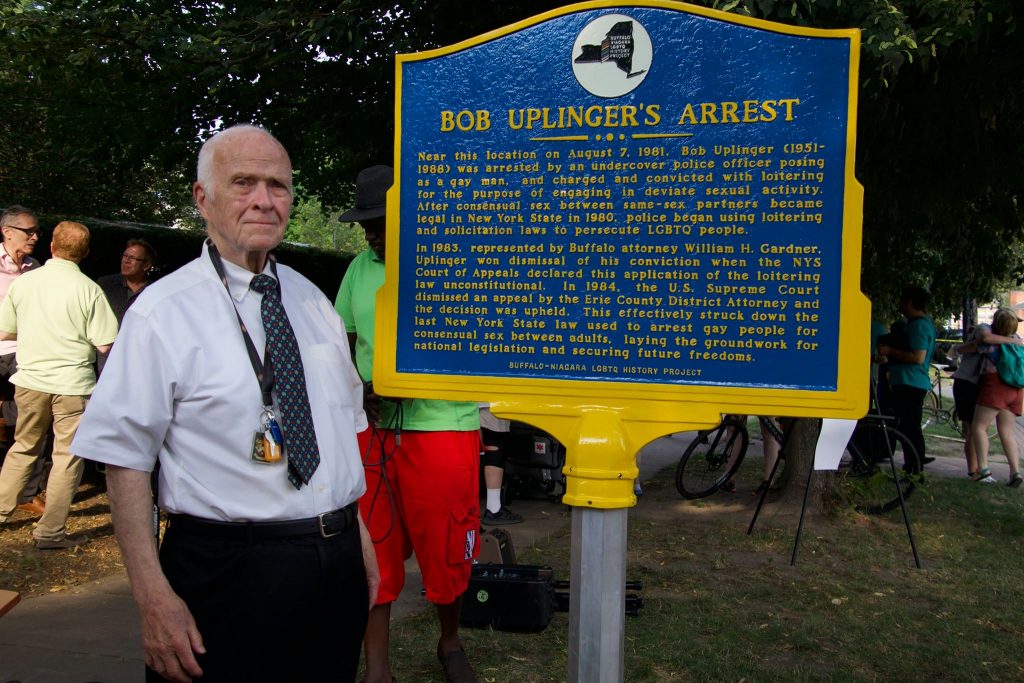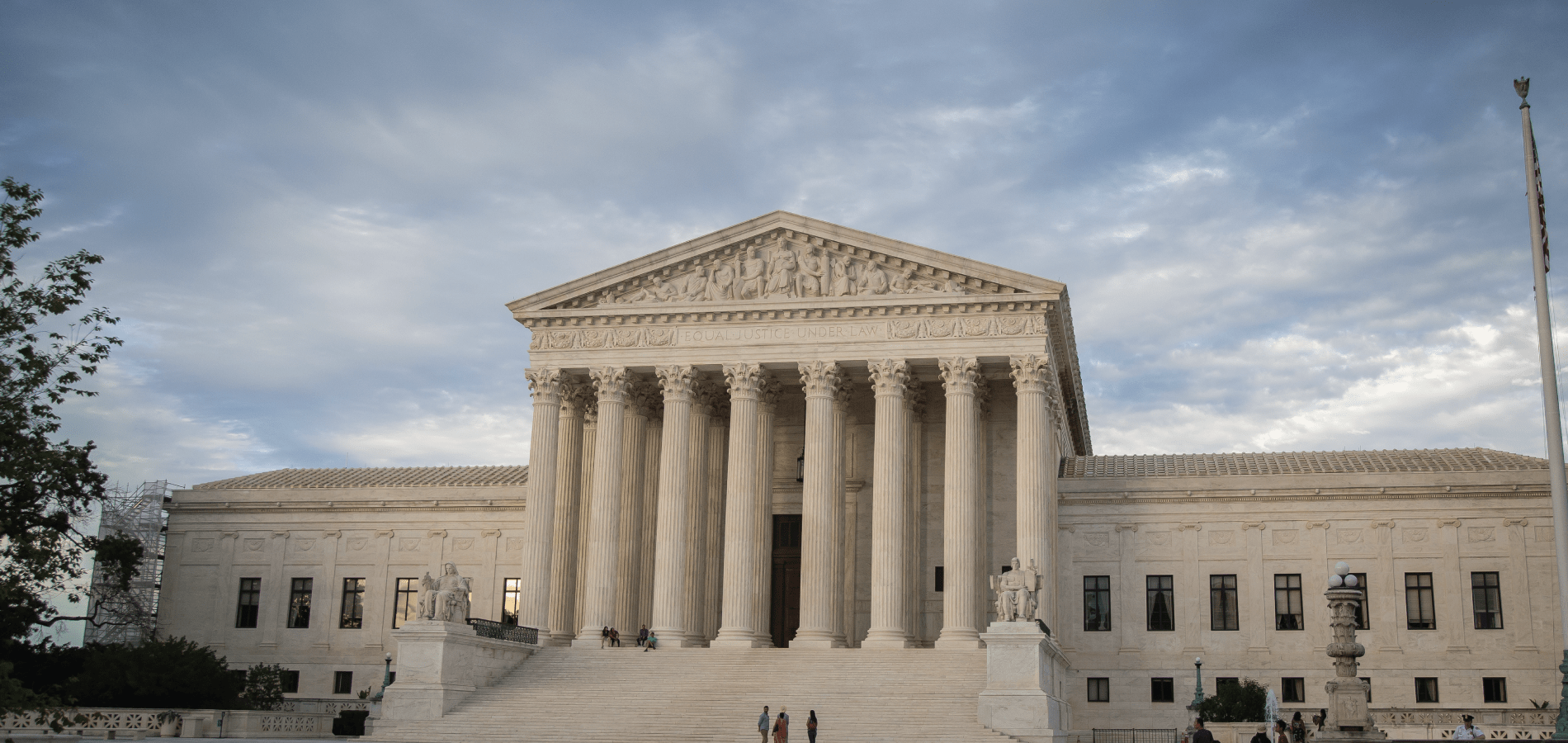On January 18, 1984, the United States Supreme Court heard arguments in State of New York v. Robert Uplinger and Susan Butler, a case that would have a momentous impact on LGBTQ+ rights in the State of New York. The origins of the case date back to 1981 in Buffalo, hometown to HeinOnline. Keep reading to explore one of the most important, and lesser known, events in LGBTQ+ legal history: the arrest and trials of Bob Uplinger.
The Arrest
At 3AM on the night of August 7, 1981, Robert Uplinger—who went by “Bob”—was walking home from a night out in Allentown, a neighborhood of Buffalo known for its nightlife, home to many of the bars and cultural centers frequented by members of Buffalo’s tight-knit gay community. On his way home, Uplinger encountered another young man in the midst of a crowd of people enjoying the summer night and struck up a conversation with him. Eventually, Uplinger invited him to his home and offered to have sex with him. Unbeknownst to Uplinger, this man was an undercover officer with the Buffalo Police Department’s vice squad. Uplinger was arrested and charged with violating New York Penal Law section 240.35(3) which prohibited “loitering to solicit for deviate sexual activities a person not married to the solicitor.“[1]Thomas G. Cannon, Can a State Stop Public Solicitation for Private Deviate Sex (82-1724), 1983 PREVIEW U.S. Sup. CT. Cas. 365 (9). This document can be found in HeinOnline’s Preview of U.S. Supreme Court Cases.

Image is author’s own photo.
Uplinger, like many gay men in Buffalo at the time, was no stranger to harassment and intimidation. This time, he had had enough. He decided to fight the charges and called William Gardner, a local attorney known for representing gay men who had been charged under loitering and solicitation laws or otherwise harassed by the authorities. As Gardner described his work: “I let various folks and gay organizations know that if they brought me people, I would represent them for free. If they wanted to make a case and fight the system, I was ready to do that. I was confident that sooner or later someone would show up who wanted to fight and not be a victim.”

The Trials
Gardner and Uplinger saw an opportunity to make progress in New York State where, only the previous year, the New York State Court of Appeals struck down laws banning “deviate sexual behavior” (under which same-sex relations were included) in their ruling in People v. Onofre.[2]People v. Onofre, 434 N.Y.S.2d 947 (New York 1980). This case can be found in Fastcase. However, even though consensual same-sex relations were legal in New York, the solicitation of relations remained illegal. This was the contradiction upon which Uplinger’s fate hinged.
Uplinger’s case went through several trials in New York State before reaching the United States Supreme Court. His first trial, in Buffalo City Court in 1981, resulted in him being convicted and fined $100. Uplinger and Gardner appealed the case in Erie County Court, which reaffirmed the lower court’s decision, keeping the conviction in place. They appealed once more, and the case appeared before the New York Court of Appeals which, in a 6-1 ruling,[3]People v. Uplinger, 460 N.Y.S.2d 514 (New York 1980). This case can be found in Fastcase. found section 240.35 to be unconstitutional because it “prohibited the public solicitation of an act which could be legally performed in private.“[4]Thomas G. Cannon, Can a State Stop Public Solicitation for Private Deviate Sex (82-1724), 1983 PREVIEW U.S. Sup. CT. Cas. 365 (9). This document can be found in HeinOnline’s Preview of U.S. Supreme Court Cases.
The Erie County District Attorney appealed the ruling, and on January 18, 1984, the Supreme Court heard arguments in Uplinger’s case, now designated State of New York v. Robert Uplinger and Susan Butler, after Uplinger’s case was joined with that of Susan Butler, a woman who was also convicted of soliciting “deviate sexual behavior” in Buffalo in 1981. On May 30, 1984, the Supreme Court decided to dismiss the case,[5]New York v. Uplinger, 467 U.S. 246 (United States Supreme Court 1984). This case can be found in Fastcase. allowing the New York Court of Appeals’ earlier decision to stand, and effectively eliminating the last law that allowed for the arrest of LGBTQ+ adults for consensual sex in New York.
Uplinger’s Life and Legacy
Uplinger had a MA in Elementary Education and spent his career teaching in Buffalo Public Schools. He continued his youth advocacy work outside the classroom, even as his trial began to gain national attention, co-founding Gay and Lesbian Youth of Buffalo, alongside members of the Mattachine Society of the Niagara Frontier, Buffalo’s first gay rights organization. The organization, now named GLYS (Growing LGBTQ+ Youth Support), continues to provide mentorship and support for LGBTQ+ youth in the region today. Uplinger continued working in Buffalo Public Schools until 1986, when he accepted a teaching position in Florida. Like many gay men of his generation, in the years before effective HIV/AIDS treatment, Uplinger’s life was tragically short. He fell ill after moving to Florida and died of AIDS-related illness in 1988, at the age of 37.

Progress Isn’t Always a Straight Line
By declining to rule on the merits of New York v. Uplinger, the Supreme Court avoided ruling on potentially significant questions pertaining to the right to public speech. In so doing, they effectively secured important rights for LGBTQ+ individuals in New York, but left the situation for people in other states far more ambiguous. In fact, only two years later, the Supreme Court ruled in Bowers v. Hardwick [6]Bowers v. Hardwick, 478 U.S. 186 (United States Supreme Court 1986). This case can be found in Fastcase. that there was no constitutional protection for consensual acts of sodomy between adults, thereby allowing states to continue to pass and enforce laws against sex between LGBTQ+ adults. This would remain the case for nearly two more decades, until Lawrence v. Texas,[7]Lawrence et al. v. Texas, 539 U.S. 558, 606 (2003). This case can be found in HeinOnline’s U.S. Supreme Court Library. when the Supreme Court found that a Texas statute against same-sex relations violated the due process clause of the 14th Amendment, thereby invalidating the anti-sodomy laws remaining in 14 states.
Lawrence v. Texas removed the last legal pretexts for arresting LGBTQ+ people for consensual sex nationwide. However, its legal status has been called into question by jurists such as Clarence Thomas who, in his concurring opinion for the landmark Dobbs v. Jackson[8]19-1392 U.S. Reports 1 (2021) Dobbs, State Health Officer of the Mississippi Department of Health, et al. v. Jackson Women’s Health Organization et al. This slip opinion can be found in HeinOnline’s U.S. Supreme Court Library. case—which reversed Roe v. Wade[9]Roe et al. v. Wade, District Attorney of Dallas County, 410 U.S. 113, 178 (1973). This case can be found in HeinOnline’s U.S. Supreme Court Library. and ended the nation-wide right to abortion access—indicated that other cases decided on the basis of the due process clause, including Lawrence v. Texas, should be reconsidered. Although no other members of the Court joined Thomas in this opinion, it is an indication that, in the eyes of some members of the judiciary, the rights established by cases such as People v. Uplinger are far from settled.

Further Reading and Research
If you want to continue looking into LGBTQ+ rights in the United States, HeinOnline’s LGBTQ+ Rights database provides a great portal to start your research. It’s part of our perpetually free Social Justice Suite, which is included with all Core subscriptions and is available free to any libraries or interested organizations. Researchers interested in the Supreme Court and questions of constitutional law may also want to check out Preview of United States Supreme Court Cases and our U.S. Supreme Court Library.
For those interested in researching the legal history of LGBTQ+ rights in Western New York, the Dr. Madeline Davis LGBTQ Archive of Western New York at Buffalo State University hosts an extensive collection of rare materials pertaining to local LGBTQ+ individuals and organizations, spanning from 1920-2018, including this fascinating interview with Bill Gardner, where he discusses his legal practice and years of activism in Buffalo, including his work on Uplinger’s case. The Buffalo-Niagara LGBTQ History Project has a rich collection of photos and stories from Bob Uplinger’s life on their Instagram page, along with the stories and photos of numerous other figures in local history. They facilitate frequent cultural, historical, and educational events in Buffalo and the wider region, including an exhibition at the Buffalo History Museum that is running through the end of June.
HeinOnline Sources[+]
| ↑1, ↑4 | Thomas G. Cannon, Can a State Stop Public Solicitation for Private Deviate Sex (82-1724), 1983 PREVIEW U.S. Sup. CT. Cas. 365 (9). This document can be found in HeinOnline’s Preview of U.S. Supreme Court Cases. |
|---|---|
| ↑2 | People v. Onofre, 434 N.Y.S.2d 947 (New York 1980). This case can be found in Fastcase. |
| ↑3 | People v. Uplinger, 460 N.Y.S.2d 514 (New York 1980). This case can be found in Fastcase. |
| ↑5 | New York v. Uplinger, 467 U.S. 246 (United States Supreme Court 1984). This case can be found in Fastcase. |
| ↑6 | Bowers v. Hardwick, 478 U.S. 186 (United States Supreme Court 1986). This case can be found in Fastcase. |
| ↑7 | Lawrence et al. v. Texas, 539 U.S. 558, 606 (2003). This case can be found in HeinOnline’s U.S. Supreme Court Library. |
| ↑8 | 19-1392 U.S. Reports 1 (2021) Dobbs, State Health Officer of the Mississippi Department of Health, et al. v. Jackson Women’s Health Organization et al. This slip opinion can be found in HeinOnline’s U.S. Supreme Court Library. |
| ↑9 | Roe et al. v. Wade, District Attorney of Dallas County, 410 U.S. 113, 178 (1973). This case can be found in HeinOnline’s U.S. Supreme Court Library. |



